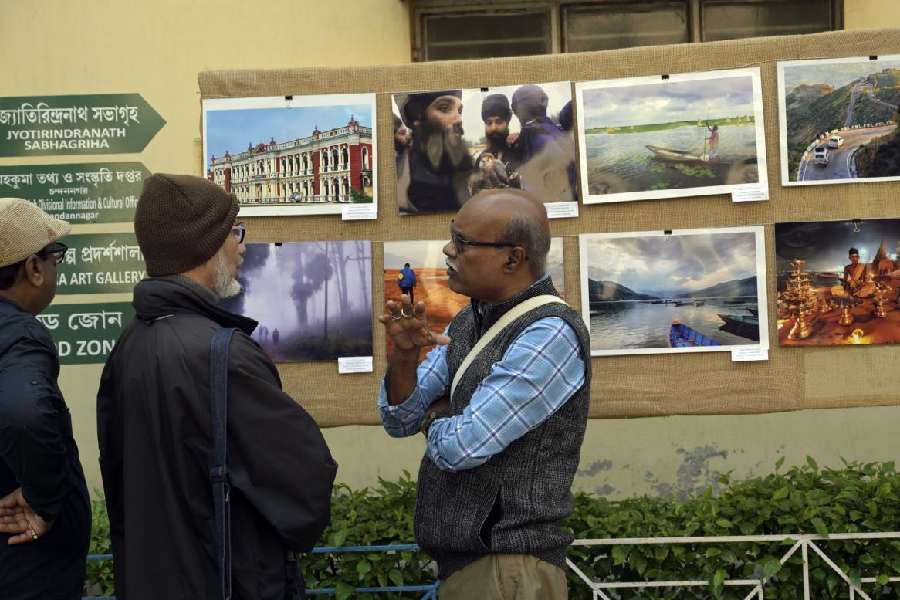Every year, on the third Sunday of December, they all come together and swap tales of their travels. And that is how it has been the last two decades. Without fail. This year too, over 500 people came together at Chandernagore’s Rabindra Bhavan auditorium for the 26th edition of Bhra-man Adda, a get-together of people who love to travel.
Bhraman Adda was conceptualised by four friends, Bhaskar Ray, Biplab Basu, Ratna Bhattacharyya and Shakti Bhattacharyya, who have known each other since their childhood. Their different day jobs notwithstanding — Biplab and Bhaskar used to work as draftsmen with the CESC, Shakti is a retired schoolteacher and Ratna gives private tuitions — what they have in common is their peregrination. The first time they set off together was in 1987 to Ghatshila, now in Jharkhand. Their last travel together was in November 2023, to Dooars in north Bengal.
Once, 26 years ago, when they returned from Kedarnath and Badrinath, the four sat together one evening recalling their experiences, flipping through photo albums. Says Shakti, “We remembered many people whom we had met on our journey. They were strangers but fellow travellers. Without them, the journey could never have been the same. But we had lost them already.”
That year, they organised a meeting with 20 people, from in and around Bhadreswar, which is where they lived. It was an evening adda dedicated to travel anecdotes and memories; the turnout was robust, the experience precious. It felt like travelling, almost virtually.
Emboldened, Ratna started sending out postcards to all those pathikbandhus whose addresses they had taken down during their collective and individual travels. People from Assam, Odisha, Bangalore, Pune, Delhi, Gujarat, and Rajasthan. Among them were doctors, engineers, bank officials, teachers, researchers, students... From then to now, Bhraman Adda has grown. “By word of mouth alone,” says Shakti.
On December 17, 2023, people across demographics convened. “It is our day. I cancel all plans and book tickets in advance for this,” says Nandalal Sarma, a 70-something retired schoolteacher from Silchar in Assam, while chomping on kachoris and trying to balance a cup of piping hot tea.
The event has several parts. At the entrance to Rabindra Bhavan, there is a photography exhibition. On display are scenes that include the pyramids of Egypt, a little girl staring out of a train, Sandakphu in winter, Gangasagar Mela, the mountains of Sikkim, Ladakh, birds at a forest reserve in the Sunderbans. “Of the 400 submissions, we selected 80,” says Shakti. Inside, a slide show is on. The images on display are by invitation only; among them a collection from Darjeeling, another of Mousuni Island near Namkhana, shots from Mongolia, from Bandhavgarh...
On stage, Joydeep Mitra, who works with an insurance company, is narrating his experience of attending a transgender fair somewhere in south India. It is a semi-religious occasion where the transgenders pray to their god. Shakti also takes the stage at one point and starts to tell his audience about a forgotten revolutionary Bindee Tiwari and the Barrackpore military uprising of 1824. Tiwari was hanged from a tree inside the Barrackpore Cantonment where Mangal Pandey and his group were also sentenced to death later. “The tree still stands there. There is a statue of Tiwari and a small temple under that tree now. But the common man is ignorant about his existence,” he says.
As it turns out, this kind of travel is no longer a middle-class preserve. Gour Kabiraj, 60, is a rickshaw-puller; he has travelled to Tamil Nadu, Odisha and Gujarat with his wife, in his rickshaw. Haripada Chakraborty, 75, is a priest who has travelled across India on foot. Before he sets out on his annual travels, he stocks cow dung cakes, which his wife sells for a living. Bichubala Debi, 65, is a cook. She has learnt to combine her work with her travel dreams. “I have visited the char dham and other tirtha sthans while working,” she tells The Telegraph.
Post-lunch, things start to wrap up. Dibakar Das from Asansol’s Rupnarayanpur hurriedly finishes a cup of tea as he wants to return the same evening. Amitabha Goswami is in no mood to leave. He has already missed three trains but he continues his adda with Jamal Talukdar. Both Goswami and Talukdar were colleagues but now that they are retired and stay miles apart, they hardly meet.
Students like Rupsa Mitra and Mohor Ganguly are volunteers. They are looking after a bookstall. “But our fascination lies in the stories these people narrate. They tell us stories of places we have not heard of. And the more I hear, the more I dream of going around the world on my own... sometime, someday,” says Rupsa.
A couple, both of them in their late 70s, says, “We barely go out now. But we come here every year. It gives us a new lease of life. It gives us the feeling that we are still travelling.”











